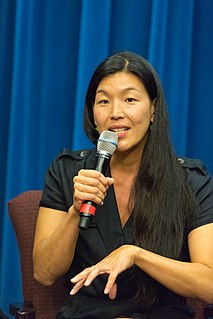A Quote by Chris Robinson
When I think about the real pioneers of the psychedelic movement in a musical sense, not just the culture, everything had a handmade sort of vibe to it. We're inventing our culture as we move along into this.
Related Quotes
I think we really need a movement to drive how popular culture understands the issues that feminists care about. When I think about the LGBT movement for example, they have had a really intentional strategy to try to change images and representation of LGBT people in the media and the culture. It really moved the dial politically. That's what is needed in the women's movement - a strategy that can drive awareness and culture change.
Since the 1960s, mainstream media has searched out and co-opted the most authentic things it could find in youth culture, whether that was psychedelic culture, anti-war culture, blue jeans culture. Eventually heavy metal culture, rap culture, electronica - they'll look for it and then market it back to kids at the mall.
I don't think there is a 'gay lifestyle.' I think that's superficial crap, all that talk about gay culture. A couple of restaurants on Castro Street and a couple of magazines do not constitute culture. Michelangelo is culture. Virginia Woolf is culture. So let's don't confuse our terms. Wearing earrings is not culture.
We have a system that is deeply narcissistic - the consumer sort of capitalist culture. It's all about me and now and what do I need that just makes you feel a bit better with all the stress. But in other healthy cultures, they have a real sense of ancestor and a sense of the next seven generations.
The real controversy comes with anthropologists - not all, but some - who see themselves as studying culture, and they then see culture from the perspective of humans, which is what they study. From their perspective, or, from some of their perspectives, it's sort of heresy to even talk about culture in any other animal. Others would say, "Yeah, you can talk about it, but our definitions of culture are so utterly different from yours and include things like values, and so on, which you've never shown to exist in any of these other creatures."
I always thought that there was something in hip-hop culture that was the misfit of all the musical styles, where they didn't really belong. They're kind of like, 'No, we're a real culture! We're not going anywhere, you can't get rid of us!' I really liked that there was a rebelliousness about it. I connected with that.
There is a certain amount of righteous indignation I hold for the American culture, because to get back to the real root of it, to get broader about it, my opinion that is my species - and my culture in America specifically - have let me down and betrayed me. I think this species had great, great promise, with this great upper brain that we have, and I think we squandered it on God and Mammon. And I think this culture of ours has such promise, with the promise of real, true freedom, and then everyone has been shackled by ownership and possessions and acquisition and status and power.
I really feel concerned about young people within our present culture. Our present culture, we have to change. Change is inevitable and I wasn't raised in our present culture but it has great pressure that as a young person I never had. Material pressure, social pressure, visual pressure, how you look, and I just try to appeal to young people to think for themselves, to be their own person, and to ask questions and also be very attentive to our planet and our environment.


































